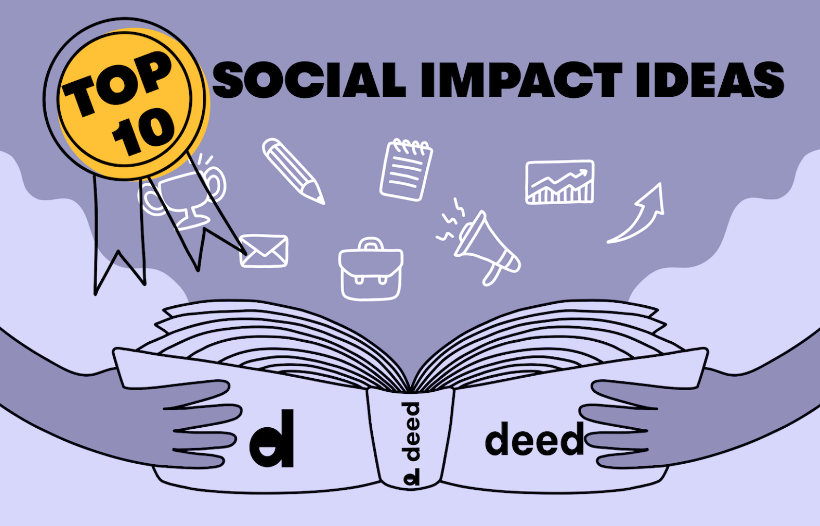The Top 10 Ideas on Corporate Social Impact from 2023
These points and trends may have surged in 2023 but they will define 2024.
Introduction
This article first appeared in Vantage, a monthly newsletter on the future of responsible business from Deed. Subscribe now for curated industry news and media, exclusive event invitations, and more.
From embracing environmental, social, and corporate governance (ESG) to measuring the actual impact of workplace giving and volunteering programs, social impact leaders had a lot of great aims and ideas this year. But how do we incorporate what we've learned into our programs in 2024?
Let's take a look at some of the most compelling ideas and then think about how to bring them into our daily work.
The Top 10 Ideas on Corporate Social Impact from 2023
1. It’s important to craft a compelling, authentic story about your organization’s social impact.
By a wide margin, “Social Impact Storytelling: By the Numbers” was the most popular article from our blog this year, because now more than ever people understand that “It’s up to social impact leaders to show how one good deed snowballs into another, then another, until, with time and effort, purpose becomes the center of work life.”
2. Trust remains central to corporate social responsibility.
With its knack for good timing, Edelman, the world’s largest public relations firm, published its annual “Trust Barometer” just ahead of the World Economic Forum’s marquee conference in Switzerland to much fanfare. The skinny? Distrust is “now society’s default emotion,” and companies outrank governments in the squinting public eye. However, responsible business firebrand Alison Taylor argues “all of this is a form of PR, [the idea] that trust is something you can accumulate like money.” Taylor, executive director of Ethical Systems and clinical professor at New York University’s Stern School of Business, adds that “what is being called ‘trust’ here is not ‘trust’ in any kind of academic understanding. This is reputation.” Where do you stand? Check out Edeleman’s report—or just the takeaways—and criticism in The Guardian.
3. Workplace volunteering needs to be flexible, diverse, and repeatable.
In the past five years, enterprise companies have exceeded all expectations and established a new baseline for corporate social impact. Three trends grew throughout 2023 and will continue to define corporate volunteerism in 2023. Read the full story.
4. 2023 shaped ESG regulations, but there’s still work to be done.
Earlier this year, the U.S. Securities and Exchange Commission released its proposal for new rules for managing and disclosing environmental, social, and corporate governance (ESG) factors. The final version has yet to materialize, and ESG seems to have fallen on the list of SEC priorities for the coming year. Read what we might expect in 2024 in Bloomberg Law.
5. There’s a huge difference between intent and impact.
This year, we hosted a three-part webinar with our partner True Impact. The subject: How to put your organization’s giving and volunteering data to work maximizing your total impact. There is a common misperception that the difference between talking about intent and talking about impact is merely rhetorical, a matter of word choice. The truth is that impact is measurable and knowable; there’s no magic word that can take the place of the number of mouths fed, backs clothed, or pounds of carbon taken out of the supply chain. Read more in our takeaways.
6. Loneliness may be as harmful as smoking “15 cigarettes per day.” United States Surgeon General Vivek Murthy’s "Advisory: Our Epidemic of Loneliness and Isolation" sent shockwaves through the media. “Loneliness is far more than just a bad feeling,” Murthy writes:
…it harms both individual and societal health. It is associated with a greater risk of cardiovascular disease, dementia, stroke, depression, anxiety, and premature death . . . The harmful consequences of a society that lacks social connection can be felt in our schools, workplaces, and civic organizations, where performance, productivity, and engagement are diminished.
How do we stop this dangerous trend? The Financial Times argues that “executives’ response to this newly declared epidemic must start with what it means to their own people.” In many cases that means thinking critically about how business decisions—like leveraging artificial intelligence and revoking flexible work arrangements—may impact mental health and wellness.
7. Companies need to do all they can to create a “culture of service.”
Over the past year, enterprise blockchain leader Ripple has seen eye-popping employee participation in charitable giving, volunteerism, and genuine human connection throughout their organization—to the tune of 78 percent. Read our spotlight to learn how they get it done.
8. There is a real human cost to artificial intelligence.
A bombshell report in New York Magazine reveals that “behind even the most impressive AI system are people—huge numbers of people labeling data to train it and clarifying data when it gets confused,” with some earning as little as $1.20 per hour. But it’s not just technology companies developing machine learning tools that need to treat workers fairly; it’s up to all of us learning to work alongside AI to think deeply about the ethical issues involved with an increasingly complex industry. Read “AI is a Lot of Work."
9. “Integrated philanthropy” is changing corporate social impact.
Nina Rauch, Head of Social Impact at the leading insurance innovator Lemonade, notes that “We’ve found employees are more motivated and engaged when they work for a company that cares about social issues. Engaging in charitable work can foster a sense of purpose and camaraderie among employees, and social impact initiatives often require innovative solutions.” For more on how employee engagement in social impact helps Deed partner Lemonade transform insurance as we know it, read Rauch’s latest for Fast Company.
10. Give nonprofits the final say.
It can be easy to lose sight of the hard, daily work that nonprofit staff put in day in and day out. But their efforts don’t end when our office volunteer days adn fundraisers end. In November, Makeeba McCreary from New Commonwealth Racial Equity and Social Justice Fund and Bob Giannino from United Way Of Massachusetts Bay wrote a moving plea for funding in WBUR which we’ll leave as this newsletter’s final word for 2023:
Ask the leader of any nonprofit about their experience with funders, and they’ll tell you about a time when they had to contort their vision to fit a particular funder’s priorities. These stories are not anomalies—they are the norm...[Changing] systems and practices that have been in place for generations is hard. But it is never too late to take steps toward a more equitable approach to giving.
Final thoughts
Deed's 365-day editorial calendar offers timely, useful content that will keep social impact programs, workplace volunteering projects, and employee resource groups humming year round. In addition to our Vantage newsletter, Deed partners receive monthly toolkits, employee engagement playbooks for special awareness days, and more.
Deed is an enterprise social impact platform that makes it fun and easy for millions of employees to share their time, money, and talent with causes they care about. We started as a viral volunteering app, and today our platform gives the world’s most inspiring brands—from lululemon to Airbnb—one exceptionally-designed home for all of their purpose-driven activities.
Corporate grantmaking, employee donations/matching, diversity & inclusion, and employee resource groups (ERGs) are only the beginning. Because over the past three to five years, everyone’s expectations for Fortune 500 corporate social responsibility have radically changed. But with our trusted integration partners like Workday and PayPal, hand-in-hand customer service, and a collaborative product team, Deed’s platform moves at the speed of work.
To start putting the most interesting and effective ideas in social impact into practice at your organization, reach out today.



